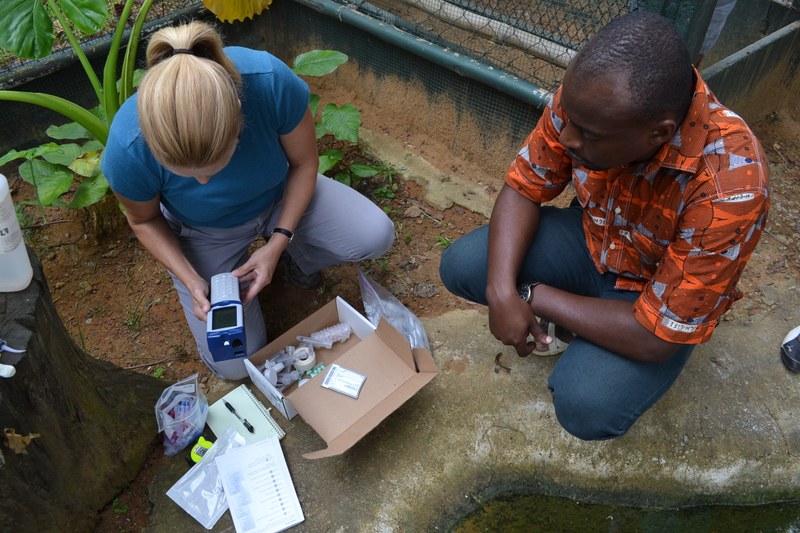
Crocodiles, chimps and progress
ABQ BioPark’s partnership with West African zoo continues to build
Progress was the theme of a presentation about the ABQ BioPark’s latest trip to the Zoo National d'Abidjan in the Ivory Coast.
Five BioPark staff visited the zoo, which has the largest population of one of the world’s most endangered reptiles—the West African slender snouted crocodile. The five staff all spoke during two presentations January 7 and 9 at the ABQ BioPark Zoo.
Matt Eschenbrenner, ABQ BioPark supervisor of herpetology, talked about his enthusiasm concerning the growth of the partnership. He was a member of the first exchange in 2014 and returned in 2015. He also noted that the zoo is developing a 5-year-plan for the future of the project.
The 2015 trip focused on crocodile exams, but also expanded from the 2014 trip to include a variety of other projects including egg incubator setup and repair, chimpanzee relocation, filtration system construction for the crocodile exhibit, keeper/animal husbandry training, exhibit design and repair, and general goodwill.
“Everybody got attention, let’s put it that way,” said Eschenbrenner.
The staff did exams on all the young crocodiles, taking measurements and collecting blood values for things like potassium, sodium and ionized calcium. Staff Veterinarian Carol Bradford noted that the juvenile crocodiles were low on calcium, which could soften their bones as they grow. Bradford recommended dietary changes to combat this and said the crew will compare these values again on subsequent trips.
During the rainy season, a mudslide severely damaged the Abidjan zoo’s chimp enclosure and Zookeeper II Kelsey Rowe helped relocate six chimpanzees to a better exhibit. In addition to the move, Rowe taught the local keepers some enrichment training. One overweight chimp is now benefitting from target training, which is encouraging her to move around more in the exhibit.
Senior Zookeeper Chaz Moxley touched on husbandry and keeper training. One of his concentrations while at the Abidjan zoo was teaching local zookeepers about enrichment. He said that many of the local staff had years of experience, but lacked funding and access to different perspectives outside their own zoo gates.
Moxley also advised zookeepers on how to improve animal lives through repurposing empty spaces—while there, they moved a caracal from a small cage to old jackal exhibit that was much larger.
The group also helped with maintenance projects with Construction Fabrication Installer Clovis Perea in the lead.
Perea said finding supplies for the alligator exhibit filtration system was like a wild goose chase—they ended up traveling from shack to shack in search of what they needed.
“It was very fun. It was very interesting. We didn’t think we’d find any of this stuff. The first day we got there we were looking for a Home Depot or a Lowe’s – we didn’t find that,” Perea laughed.
The next ABQ BioPark trip to Abidjan will occur in September 2016. Future trips will focus on crocodile diet and health evaluations, addressing drainage problems throughout zoo, new exhibit design and construction, animal moves, continuing to build a relationship with the zoo, improving space and security of the chimpanzee enclosure, and working with the local United States embassy.
“We can consider them our friends now and I can’t think of anyone else I’d want to help,” said Eschenbrenner.
The presentation was part of a Brown Bag series offered twice a month at the ABQ BioPark. Check online for information about upcoming Brown Bag presentations.

